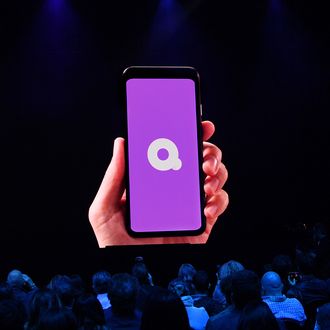
After two years of hype, Quibi is now a living, streaming thing, available to download via the Apple App Store or the Google Play Store. But while execs at Quibi have made it clear from the start that theirs is a service designed only for mobile streaming, now that actual consumers are getting their hands on it, they’re discovering just how seriously Quibi execs are about watching shows on a phone — and nowhere else. Not only is there no Quibi app for smart TVs or streaming devices such as Roku, engineers at the platform have apparently made it impossible to use Chromecast or the screen mirroring function on Apple’s iOS platform to cast Quibi content to a TV set.
In an interview with Vulture last summer, Quibi founder Jeffrey Katzenberg explained why the company wasn’t bothering to design a version of the service optimized for bigger screens. “Nobody has made [premium] content that was native to, and only for, the phone,” Katzenberg said. “We want to do one thing which no one else is doing and see if we can do it really great.” He also said working on an app for smart TVs would be a waste of limited resources at this point in Quibi’s existence. “We’re a start-up,” Katzenberg explained. “As soon as you go out and try to be all things to all people, you end up being nothing to anybody.” As for not even allowing casting of shows, a Quibi spokesperson declined to comment on the record, though it’s likely the same thinking applies: Quibi is for phones, so don’t try to make Quibi on TV happen.
Katzenberg’s point about not wanting to muddle Quibi’s brand identity with a dedicated app makes some sense, especially early in the platform’s life. Quibi isn’t trying to compete with Netflix or Hulu in making shows you watch at home cuddled up on your couch with friends or family. Its name is short for “quick bites,” and it’s designed to be TV you snack on the go rather than binge. The current stay-at-home protocol governing half the planet limits (if not outright eliminates) things such as commutes to work or waiting for appointments, of course. But asked about this late last month, Katzenberg told Vulture he still thinks consumers will have time during the day for Quibi breaks: while eating lunch, before heading to bed, tuning out the Zoom meeting (if you’re in audio mode).
Still, there’s a difference between not wanting consumers to be confused by a TV app for Quibi and actively preventing folks from choosing to cast shows to TV screens. Even more perplexing is that Quibi has made it impossible for users to take screenshots of its programming: If you try to do so, you get a photo of a black screen. Perhaps this is the result of some overzealous Quibi lawyers worried about copyright infringement, but it also seems counterproductive for a start-up streamer to limit the ability of users to organically promote Quibi content via memes and other social media posts. A Quibi spokesperson also declined to comment on the screenshot ban, though a person familiar with the company’s thinking hinted that digital-rights issues were indeed likely behind the move.

